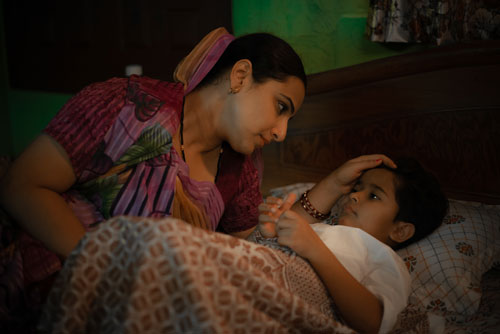
«Natkhat vous fait affronter la réalité que la plupart des femmes de ce pays vivent au jour le jour et comment nous élevons les enfants et comment si nous voulons voir un changement, nous devons élever nos enfants différemment. » – Vidya Balan
Natkhat is a 2020 Court métrage indien réalisé par Shaan Vyas, et écrit par Vyas et Annukampa Harsh. It is co-produced by and stars Vidya Balan as a doting mother who tries to educate her son Sonu on gender bias and misogyny through her bedtime stories.
It is no secret that India’s gender inequality problems have led to millions of “unwanted girls.” In an interesting twist of casting, la Natkhat producers selected a female child actor, Sanika Patel, for the main role of Sonu. La recherche globale pour l'éducation invited Producer and Actor Vidya Balan, Writer and Director Shaan Vyas, Writer Annukampa Harsh, Associate Producer Sanaya Irani Zohrabi, and Producer Ronnie Screwvala to talk about their acclaimed film.
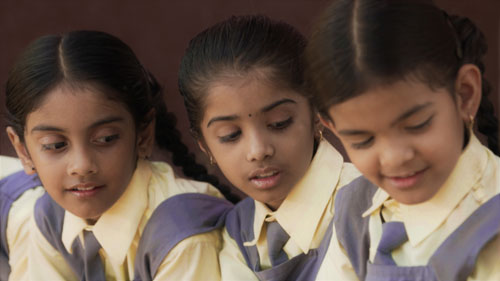
“We realized that gender inequality is not conscious. Most times, it’s unconscious.” – Shaan Vyas
What inspired you to create this movie and what’s been the reaction from audiences so far?
Vidya Balan: When this film came to my attention, it called out to me because it’s so powerful, it’s the reality of the women in our country, the way women are treated – so I just felt that if in a 30-minute short film you are able to tell this story, I thought it was an outstanding idea. The reactions have been fabulous. Natkhat makes you confront the reality that most women in this country live on a day to day basis, how we are bringing up children, and how if we want to see a change, we have to bring up our children differently.
Shaan Vyas: Dans 2018, there was a spate of cases in India about female oppression. One such case was a horrid gang rape which triggered a lot of anger in me and to channelize that, I wrote a story about parenting being a possible starting point for a solution. But my first draft of the screenplay was very dry because I was writing about masculinity from the point of view of a man and through that, about female oppression. Annukampa Harsh came on board at that point to infuse the story with female energy. Ainsi Natkhat took shape. We always set out to write a film knowing that the Indian masses are really smart viewers and one can’t underestimate them. And they not just related to it, but the film also made them check their own entitlement in parts.
Sanaya Irani Zohrani: Shaan pitched the screenplay to me and after my first read, I was sure this film had to be made for every man, woman, professeur, élève, parent, and child. It not only addresses issues that need to be addressed today but also presents a very important solution for a better tomorrow, that being parenting. The early reactions and reviews have been overwhelming and heartening. I have received countless calls and messages from fathers and mothers across India, emotional and grateful as the film led to important living room conversations they never thought they’d have or never knew how to initiate with their children, parents, famille, and friends.
India’s gender inequality problems have led to millions of “unwanted girls”. Can you elaborate on the kinds of conversations you hope this story might lead to?
Vidya Balan: Natkhat deals with toxic masculinity…patriarchy in a very intimate way. We are not talking about it as a concept, we are talking about the real experience in this woman’s life and how the child observes the men around him and begins to imitate their behavior and this is how the sense of entitlement and sense of privilege gets passed down through generations. These boys end up being men who perpetuate this gender inequality and its atrocities that women are subjected to. So I think the conversation is really around parenting, about how parenting is key.
Shaan Vyas: We realized that gender inequality is not conscious. Most times, it’s unconscious. It’s built into us evolutionarily to think that men are physically stronger than women, and as an intelligent race, it’s ironic that we took that physical inequality and made it into so much more. Growing up, a child looks at the world around him and even with the most gender-unbiased care, he will only see a male-dominated world. Our leaders are all male, our cops, army men, people in positions of power are all male. En Inde, on TV, our sports stars and cricketers are all males. Change doesn’t happen overnight and the starting point is to make people have conversations about this issue not just with each other, but with their own selves too.
Sanaya Irani Zohrabi: Does a story have the power to change us? Natkhat with its story within a story has proven that powerful storytelling can definitely lead to conversation and change. Après tout, we are our stories and our future.
Annukampa Harsh: Conversations lead to understanding and empathy, and that is the way for real change to take place. Laws and punitive systems only create fear of repercussions, not true reform. Prenatal sex-determination tests might be illegal in India but that has not eradicated female infanticide. For the birth of a girl child to be as celebratory as that of a boy, the dowry system along with other patriarchal practices needs to go, which will then not make a girl a “liability” for families. When a girl will be seen as an equal to a boy, in her abilities as well as her breadwinning capacity, we will no longer see the birth of “unwanted girls”.
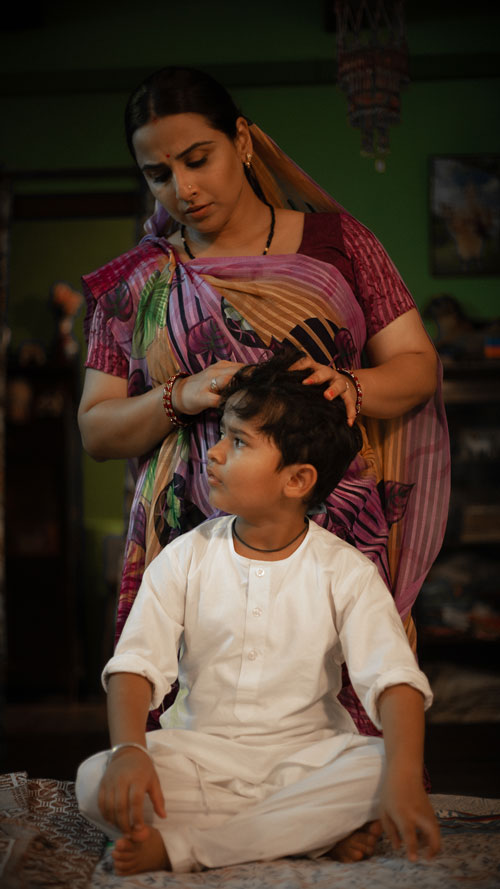
“Conversations lead to understanding and empathy, and that is the way for real change to take place.” – Annukampa Harsh
What was your thought process in casting Sanika Patel in the main role? What has been the reaction to having the main boy character played by a girl?
Vidya Balan: Shaan cast Sanika and I think it’s fabulous casting. He hit gold with Sanika, she is such a bright girl and I will never forget how one night when we were shooting, she was falling asleep and she had to give me queues because it was my closeup…the child was struggling to keep her eyes open but she still gave me the queues without a single mistake. She is special.
Annukampa Harsh: I was scrolling through Instagram when I came across an uncredited post of a little girl reciting a powerful poem by Sohanlal Dwivediji. Not only was this child’s command over the Hindi language flawless, but her recitation style was also beautifully fiery and strong! I instantly began searching for this girl, and through the comments section discovered her uncle, traced her and was on a call with her within the next hour. I instinctively knew she was our Sonu, and I texted Shaan within moments of “discovering” this child – Sanika Patel.
Shaan Vyas: Sanika was mesmerizing: extremely emotive and expressive. And the cherry on the cake was that she could remember long passages of poetry with ease: a dream come true for a director. Cependant, this was a girl. Annukampa then called me up and began persuading me to consider this girl for Sonu. She added that since I was anxious about teaching a boy the very things he’s not meant to do, this casting decision will solve that problem, while also bringing a little girl’s sensitivity during Sonu’s scenes with other girls. She mentioned that classical films frequently applied such gender-fluid casting. She had cracked it, and I was convinced: this one little decision changed the course of the film entirely.
Annukampa Harsh: The audience’s reaction to Sanika has been beautiful. For a large section of the viewers, quite a few moments in our film stand out for being highly disturbing. To learn that a girl played a pivotal role in these scenes has proved redemptive and cathartic for many. Aussi, being able to successfully “fool” audiences into believing that Sanika is a boy throughout the run-time of the film has been a huge achievement for Shaan and us. Training her, and all the other first-time actors, required a long process of workshopping and preparation, and all that work has finally paid off.
I understand that the crew was selected with gender equality in mind as well. Quel était votre processus? How challenging was it to achieve that balance on this film in particular?
Shaan Vyas: It actually was not very difficult because there is an abundance of talented crew available, irrespective of gender. A filmmaking process goes through a few storytellers, each of whom deserves as much credit as the director. Starting from the writer to the casting director to the DOP to the editor and eventually to the sound and music teams. Each of these departments has the opportunity to tell the written story in their own language. What we achieved was a balanced perspective of storytellers.
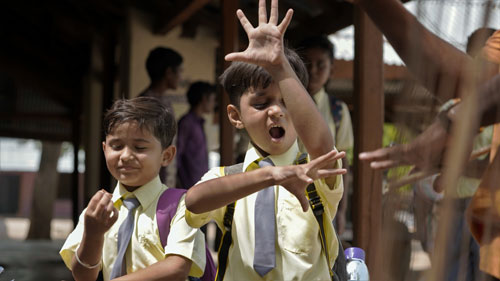
“Creativity and imagination will always thrive and find its way.” – Ronnie Screwvala
Films have become even more important as a resource to address global issues and present perspectives on societal challenges. Dans beaucoup de pays, funding for the arts is being cut. How do we foster creativity and imagination without art?
Vidya Balan: There is so much scope for creative art today because all you need is a mobile phone. You can write, you can sing, you can dance, you can paint and you can put it out there – and you can bring about a change even at a time when funds are being cut in the current scenario which is understandable because healthcare is the primary concern. I feel creativity and art can change the world and it can happen even through a mobile phone today, and therefore I don’t see any barriers.
Shaan Vyas: Humanity is going through an existential crisis right now and I keep wondering what role a film has to play in a world which is scrounging for basic necessities of life. Isn’t film a luxury? I recently got the answer to this question when someone wise told me that the world needs to be thanking filmmakers to keep us sane during a global crisis. To make people laugh and feel things. To see sense in fiction amidst the craziness of reality.
Ronnie Screwvala: Creativity and imagination will always thrive and find its way. These are crucial in any and all fields and industries regardless of global issues, challenges, and funding. Even if countries and the arts face restrictions in funding, it is imagination and creativity along with innovation and technology that will continue advancing and bridging the gaps in new and disruptive ways.
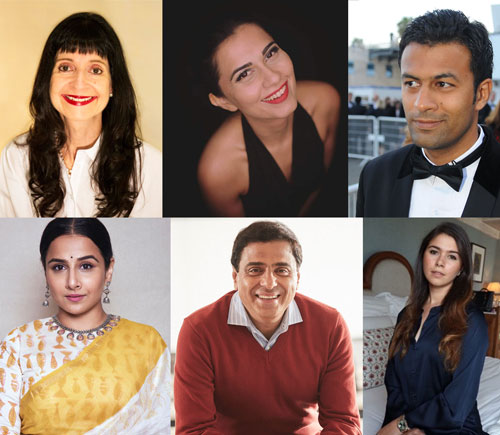
Rangée du haut: C.M. Rubin, Annukampa Harsh, Shaan Vyas
Rangée du bas: Vidya Balan, Ronnie Screwvala, Sanaya Irani Zohrabi
Merci à notre 800 plus contributeurs mondiaux, artistes, enseignants, entrepreneurs, chercheurs, des chefs d'entreprise, étudiants et leaders d'opinion de tous les domaines pour partager votre perspectives sur l'avenir de l'apprentissage avec La recherche globale pour l'éducation chaque mois.
C. M. Rubin (Cathy) est le fondateur de CMRubinWorld, un en ligne maison d'édition axée sur l'avenir de l'apprentissage mondial, et le co-fondateur de Planet Classroom. Elle est l'auteur de trois best-sellers livres et deux séries en ligne largement lues. Rubin a reçu 3 Upton Prix Sinclair pour «The Global Search for Education». Les séries, lequel défenseurs de la jeunesse, a été lancé en 2010 et rassemble des leaders d'opinion distingués du monde entier pour explorer la clé problèmes d'éducation auxquels sont confrontés les nations.
Suivez C. M. Rubin sur Twitter: www.twitter.com/@cmrubinworld

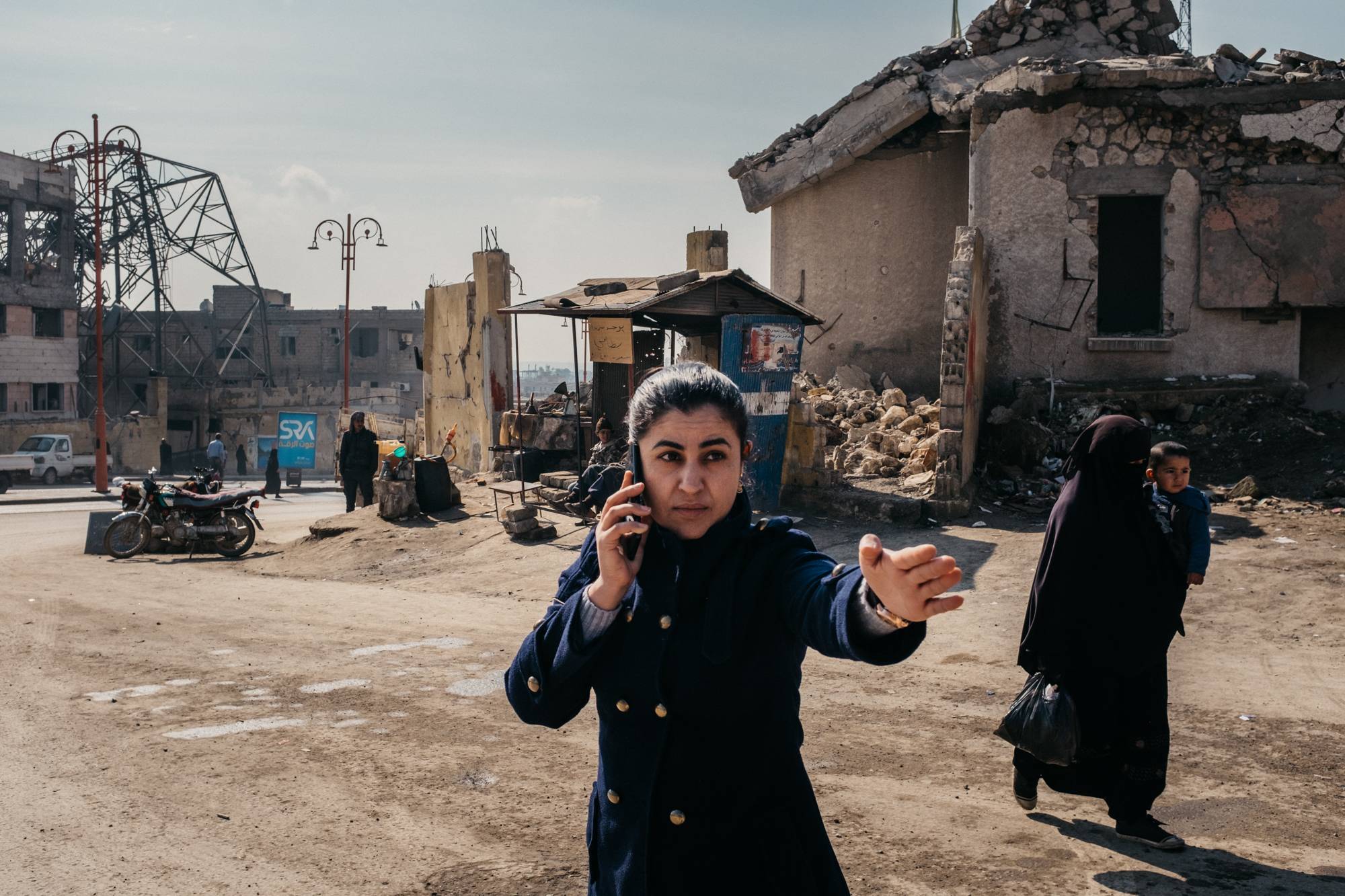

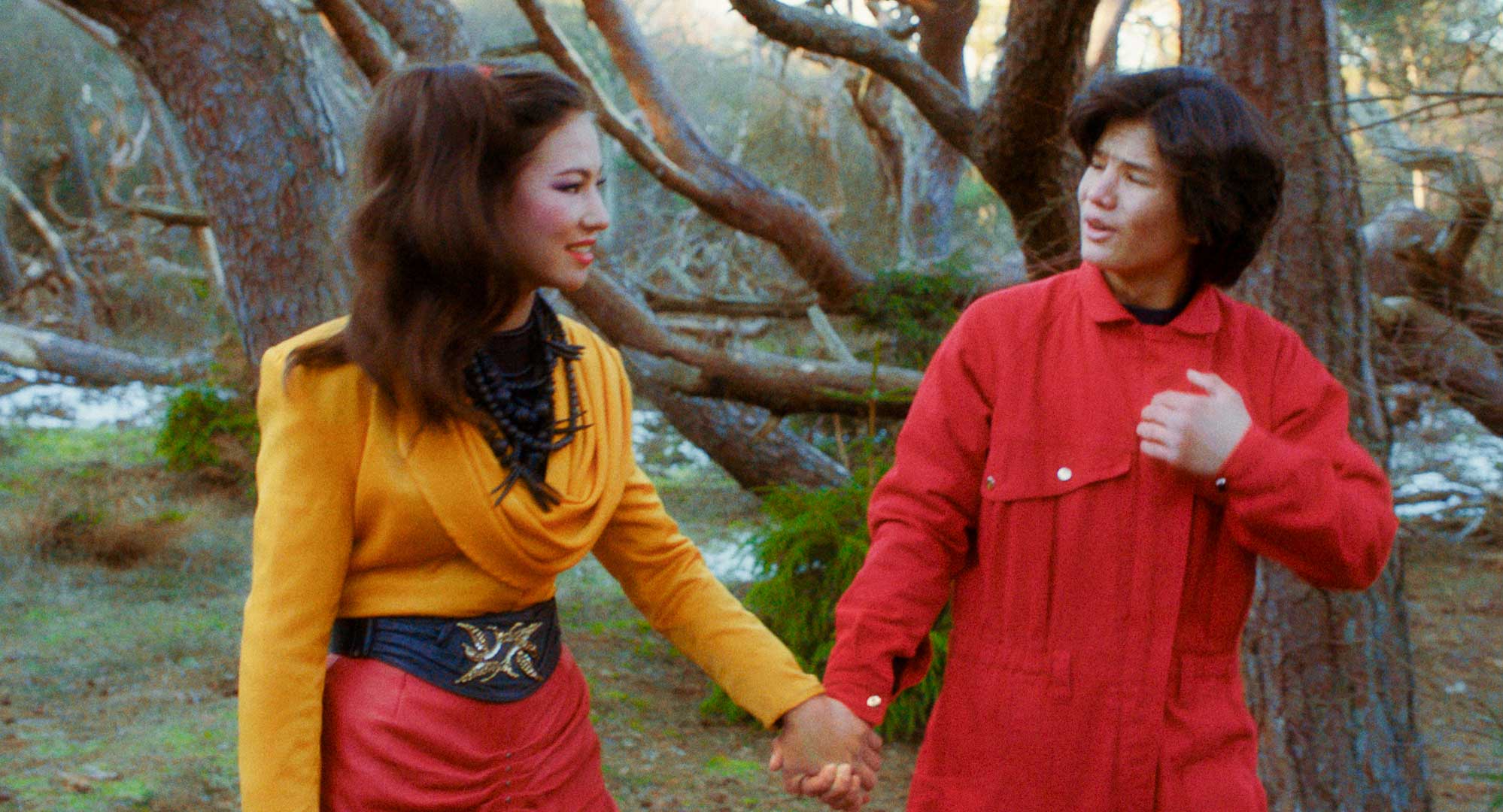

Commentaires récents